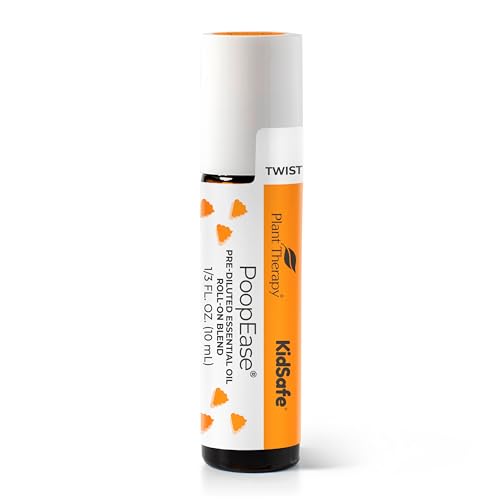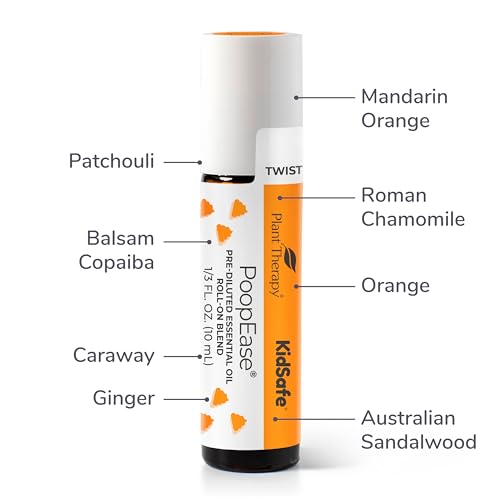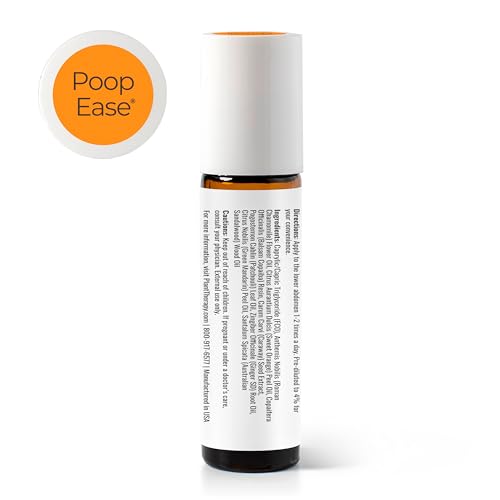


Plant Therapy Aromatherapy Oil - Pre-Diluted Digestive Support Blend, Therapeutic Grade - 10ml


Caraway Extract
High RiskCarum carvi (caraway) seed extract is an extract derived from the seeds of the caraway plant. It is commonly used in food products for its distinct flavor and aroma, as well as in cosmetics for its potential skin-beneficial properties.
Sustai Insights
Caraway extract exhibits functional benefits such as flavor enhancement in food and potential antioxidant properties in cosmetics. However, it presents high allergenic potential, posing risks of allergic reactions in sensitive individuals. Environmental concerns include its potential as a pollutant. Regulatory advisories indicate usage restrictions, leading to a high overall risk assessment. Safe usage practices should be observed, and alternatives such as coriander or fennel could be considered for similar benefits.
Anthemis Nobilis (Chamomile)
High RiskAnthemis nobilis, commonly known as chamomile, is derived from the flowering plant of the same name. It is often used in various preparations for its soothing properties and is commonly included in personal care products for its potential calming effects on the skin.
Sustai Insights
Chamomile offers functional benefits such as skin soothing and anti-inflammatory properties. However, it carries a high allergenic potential, posing risks for individuals with sensitivities. Environmental concerns include low neurotoxicity and minimal pollution risk. Regulatory bodies have noted restrictions on its use. Overall, the ingredient is assessed to have a high risk due to these factors, especially concerning allergic reactions.
Citrus Aurantium Dulcis (Orange) Peel Oil
Medium RiskCitrus aurantium dulcis (orange) peel oil is derived from the peel of oranges and is commonly used in cosmetic and personal care products for its fragrance and potential skin benefits. It is known for its aromatic properties and is often included in formulations aimed at enhancing scent profiles.
Sustai Insights
Citrus aurantium dulcis (orange) peel oil offers functional benefits such as providing a pleasant scent and potential antimicrobial properties. However, it poses a high allergy risk and may cause skin irritation in sensitive individuals. Environmental concerns include moderate persistence and potential to contribute to pollution. Regulatory warnings indicate restrictions on use in certain products. Overall, the risk level is assessed as medium, and users are advised to practice caution, particularly those with known allergies. Alternatives like sweet orange essential oil may provide similar benefits with potentially lower risks.
Citrus Reticulata Oil
Medium RiskCitrus reticulata oil is derived from the whole plant of any subspecies within the citrus reticulata species. It is commonly used in various products for its aromatic properties and potential benefits in formulations.
Sustai Insights
Citrus reticulata oil serves as a fragrance and may offer some antimicrobial properties, which can enhance product appeal. However, it is associated with high allergenic potential, posing risks for sensitive individuals. There are moderate use restrictions noted, and it may persist in the environment, raising concerns about ecological impact. Overall, the ingredient is assessed as having a medium risk level, necessitating safe usage practices and consideration of alternatives for those seeking lower-risk options.
Caprylic Triglyceride
Low RiskCaprylic triglyceride is an ester derived from coconut oil and glycerin, commonly used in cosmetic formulations as an emollient, stabilizer, and skin-conditioning agent. It helps to improve the texture and spreadability of products while providing a lightweight, non-greasy feel.
Sustai Insights
Caprylic triglyceride offers functional benefits such as enhanced skin moisturization and improved formulation stability. It is generally regarded as safe, with low concerns regarding carcinogenicity, allergenic potential, and reproductive toxicity. Environmental impact is minimal, with no significant pollutant or bioaccumulative properties identified. Regulatory bodies have not issued warnings or restrictions. Overall, the risk level is low, making it a suitable ingredient in cosmetic products. Safe usage practices include adhering to recommended concentrations, and while there are alternatives, caprylic triglyceride remains a reliable choice.
Copaiba Oil
Low RiskCopaiba oil is an essential oil derived from the balsam of copaiba trees, primarily found in South America. It is commonly used in various products for its potential therapeutic properties, including anti-inflammatory and analgesic effects.
Sustai Insights
Copaiba oil offers functional benefits such as anti-inflammatory properties and is sustainably sourced from copaiba trees, contributing to its eco-friendliness. Health risks are minimal, with low concerns for carcinogenicity, allergies, and reproductive toxicity. Environmental risks are also low, with no significant pollutant or bioaccumulation concerns. Regulatory bodies, including the FDA, do not impose restrictions on its use. Overall, copaiba oil is assessed as having a low risk profile, making it a viable option in formulations.
Zingiber Officinale (Ginger) Root Oil
Low RiskZingiber officinale (ginger) root oil is obtained from the rhizome of the ginger plant. It is commonly used in various products for its aromatic properties and potential health benefits. The oil contains bioactive compounds that may contribute to its effectiveness in formulations.
Sustai Insights
Zingiber officinale (ginger) root oil serves as a natural fragrance and may provide anti-inflammatory benefits. It is sustainably sourced and considered biodegradable. Health risks are low, with minimal concerns regarding carcinogenicity, allergenicity, or reproductive toxicity. Environmental impact is negligible, and regulatory status is compliant with current guidelines. Overall, the ingredient presents a low risk profile, making it a suitable choice in formulations.
Santalum Spicatum (Sandalwood) Oil
Low RiskSantalum spicatum (sandalwood) oil is a natural essential oil derived from the wood of the sandalwood tree. It is primarily used for its aromatic properties and is often included in perfumes, cosmetics, and skincare products for its fragrance and potential skin benefits.
Sustai Insights
Santalum spicatum (sandalwood) oil offers functional benefits such as a pleasant aroma and potential antimicrobial properties. It is considered sustainably sourced, with low concerns regarding carcinogenicity, allergenic potential, and reproductive toxicity. However, enhanced skin absorption may pose risks in certain applications. Regulatory bodies currently do not classify it as hazardous, indicating low overall risk. Safe usage practices include avoiding excessive exposure, and while no significant alternatives are noted, consumers may opt for other essential oils if desired.
Caprylic Triglyceride
Low RiskCaprylic triglyceride is an ester derived from coconut oil and glycerin, commonly used in cosmetic formulations as an emollient, stabilizer, and skin-conditioning agent. It helps to improve the texture and spreadability of products while providing a lightweight, non-greasy feel.
Sustai Insights
Caprylic triglyceride offers functional benefits such as enhanced skin moisturization and improved formulation stability. It is generally regarded as safe, with low concerns regarding carcinogenicity, allergenic potential, and reproductive toxicity. Environmental impact is minimal, with no significant pollutant or bioaccumulative properties identified. Regulatory bodies have not issued warnings or restrictions. Overall, the risk level is low, making it a suitable ingredient in cosmetic products. Safe usage practices include adhering to recommended concentrations, and while there are alternatives, caprylic triglyceride remains a reliable choice.
Copaiba Oil
Low RiskCopaiba oil is an essential oil derived from the balsam of copaiba trees, primarily found in South America. It is commonly used in various products for its potential therapeutic properties, including anti-inflammatory and analgesic effects.
Sustai Insights
Copaiba oil offers functional benefits such as anti-inflammatory properties and is sustainably sourced from copaiba trees, contributing to its eco-friendliness. Health risks are minimal, with low concerns for carcinogenicity, allergies, and reproductive toxicity. Environmental risks are also low, with no significant pollutant or bioaccumulation concerns. Regulatory bodies, including the FDA, do not impose restrictions on its use. Overall, copaiba oil is assessed as having a low risk profile, making it a viable option in formulations.
Zingiber Officinale (Ginger) Root Oil
Low RiskZingiber officinale (ginger) root oil is obtained from the rhizome of the ginger plant. It is commonly used in various products for its aromatic properties and potential health benefits. The oil contains bioactive compounds that may contribute to its effectiveness in formulations.
Sustai Insights
Zingiber officinale (ginger) root oil serves as a natural fragrance and may provide anti-inflammatory benefits. It is sustainably sourced and considered biodegradable. Health risks are low, with minimal concerns regarding carcinogenicity, allergenicity, or reproductive toxicity. Environmental impact is negligible, and regulatory status is compliant with current guidelines. Overall, the ingredient presents a low risk profile, making it a suitable choice in formulations.
Caraway Extract
High RiskCarum carvi (caraway) seed extract is an extract derived from the seeds of the caraway plant. It is commonly used in food products for its distinct flavor and aroma, as well as in cosmetics for its potential skin-beneficial properties.
Sustai Insights
Caraway extract exhibits functional benefits such as flavor enhancement in food and potential antioxidant properties in cosmetics. However, it presents high allergenic potential, posing risks of allergic reactions in sensitive individuals. Environmental concerns include its potential as a pollutant. Regulatory advisories indicate usage restrictions, leading to a high overall risk assessment. Safe usage practices should be observed, and alternatives such as coriander or fennel could be considered for similar benefits.
Citrus Aurantium Dulcis (Orange) Peel Oil
Medium RiskCitrus aurantium dulcis (orange) peel oil is derived from the peel of oranges and is commonly used in cosmetic and personal care products for its fragrance and potential skin benefits. It is known for its aromatic properties and is often included in formulations aimed at enhancing scent profiles.
Sustai Insights
Citrus aurantium dulcis (orange) peel oil offers functional benefits such as providing a pleasant scent and potential antimicrobial properties. However, it poses a high allergy risk and may cause skin irritation in sensitive individuals. Environmental concerns include moderate persistence and potential to contribute to pollution. Regulatory warnings indicate restrictions on use in certain products. Overall, the risk level is assessed as medium, and users are advised to practice caution, particularly those with known allergies. Alternatives like sweet orange essential oil may provide similar benefits with potentially lower risks.
Anthemis Nobilis (Chamomile)
High RiskAnthemis nobilis, commonly known as chamomile, is derived from the flowering plant of the same name. It is often used in various preparations for its soothing properties and is commonly included in personal care products for its potential calming effects on the skin.
Sustai Insights
Chamomile offers functional benefits such as skin soothing and anti-inflammatory properties. However, it carries a high allergenic potential, posing risks for individuals with sensitivities. Environmental concerns include low neurotoxicity and minimal pollution risk. Regulatory bodies have noted restrictions on its use. Overall, the ingredient is assessed to have a high risk due to these factors, especially concerning allergic reactions.
Citrus Reticulata Oil
Medium RiskCitrus reticulata oil is derived from the whole plant of any subspecies within the citrus reticulata species. It is commonly used in various products for its aromatic properties and potential benefits in formulations.
Sustai Insights
Citrus reticulata oil serves as a fragrance and may offer some antimicrobial properties, which can enhance product appeal. However, it is associated with high allergenic potential, posing risks for sensitive individuals. There are moderate use restrictions noted, and it may persist in the environment, raising concerns about ecological impact. Overall, the ingredient is assessed as having a medium risk level, necessitating safe usage practices and consideration of alternatives for those seeking lower-risk options.
Santalum Spicatum (Sandalwood) Oil
Low RiskSantalum spicatum (sandalwood) oil is a natural essential oil derived from the wood of the sandalwood tree. It is primarily used for its aromatic properties and is often included in perfumes, cosmetics, and skincare products for its fragrance and potential skin benefits.
Sustai Insights
Santalum spicatum (sandalwood) oil offers functional benefits such as a pleasant aroma and potential antimicrobial properties. It is considered sustainably sourced, with low concerns regarding carcinogenicity, allergenic potential, and reproductive toxicity. However, enhanced skin absorption may pose risks in certain applications. Regulatory bodies currently do not classify it as hazardous, indicating low overall risk. Safe usage practices include avoiding excessive exposure, and while no significant alternatives are noted, consumers may opt for other essential oils if desired.
Discover the soothing power of Plant Therapy KidSafe PoopEase Essential Oil Blend. This pre-diluted roll-on is specially formulated for children, combining calming essential oils to support digestive comfort. Perfect for health-conscious families, this blend is easy to apply, effective, and made with 100% pure ingredients.
- Gentle Relief: Designed for children, this blend includes Roman Chamomile, Ginger, and Patchouli to provide comforting support for occasional digestive discomfort.
- Easy Application: Simply massage the roll-on onto the lower abdomen before bedtime for a relaxing experience, making it a hassle-free addition to your nightly routine.
- Quality Assurance: Each bottle undergoes rigorous testing with batch-specific GC-MS reports, ensuring transparency and high standards for every drop of oil.
- Affordable Excellence: Renowned for its quality, Plant Therapy offers this therapeutic-grade blend at a price that won’t break the bank, making wellness accessible.
- Expert Support: Have questions? Plant Therapy's Certified Aromatherapists are available to assist, ensuring you feel confident and informed about your purchase.
Subscribe & Save with Sustai
- Best Price Guarantee: Always enjoy the lowest prices on sustainable home essentials.
- No Surprises: We’ll notify you before shipping. No hidden fees, ever.
- You’re in Charge: Change, pause, or cancel your subscription anytime with ease.
- Eco-Friendly Deliveries: Our grouped shipments mean less packaging and lower emissions.
Join us on a sustainable journey. Special offers for a limited time! Prices and promotions may change.
Recommended Products
Discover the soothing power of Plant Therapy KidSafe PoopEase Essential Oil Blend. This pre-diluted roll-on is specially formulated for children, combining calming essential oils to support digestive comfort. Perfect for health-conscious families, this blend is easy to apply, effective, and made with 100% pure ingredients.
- Gentle Relief: Designed for children, this blend includes Roman Chamomile, Ginger, and Patchouli to provide comforting support for occasional digestive discomfort.
- Easy Application: Simply massage the roll-on onto the lower abdomen before bedtime for a relaxing experience, making it a hassle-free addition to your nightly routine.
- Quality Assurance: Each bottle undergoes rigorous testing with batch-specific GC-MS reports, ensuring transparency and high standards for every drop of oil.
- Affordable Excellence: Renowned for its quality, Plant Therapy offers this therapeutic-grade blend at a price that won’t break the bank, making wellness accessible.
- Expert Support: Have questions? Plant Therapy's Certified Aromatherapists are available to assist, ensuring you feel confident and informed about your purchase.

You can have at most 2 Sustainable Steals products in your cart
Customer Reviews
Customers’ View
Customers express a generally positive sentiment towards the Essential Oil Blend, highlighting its effectiveness in providing comfort and relaxation, particularly for children experiencing anxiety related to bowel movements. Many parents report that the roll-on application is convenient and easy to use, noting that their children feel a sense of relief shortly after application. For instance, one customer mentioned noticeable success in their child's bowel movements after using the oil. Additionally, users appreciate the natural ingredients, emphasizing their alignment with health-conscious values. While some reviews indicated mixed results, overall, customers find this product beneficial and supportive of their family's well-being.
AI-generated from the text of customer reviewsThis product is rated 5.0 of 5.0 stars.
It has received 2 reviews.





